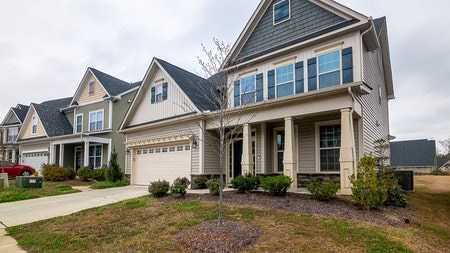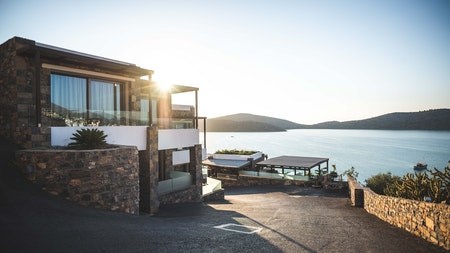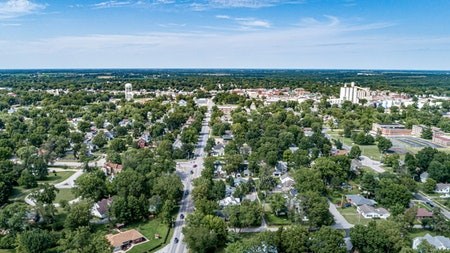Residential properties with studies or home offices are attracting multiple offers from Port Elizabeth buyers – a trend that wasn’t on the radar 12 months ago. That’s according to Justin Kreusch and Ian Olivier, principal agents of Pam Golding Properties in Port Elizabeth, who say the current market is seeing some unexpected and unusual buying trends.
Aside from an increase in demand for homes with separate workspaces, they say the market is also experiencing more-than-usual interest from buyers wanting to relocate to the countryside.
“The pandemic has brought with it a new normal in terms of remote working, and with so many people no longer commuting to the office every day, out-of-town living has become a lot more viable,” explains Olivier.
Out of town demand rising
Adds Kreusch: “There is a visible uptick in interest in outlying residential developments such as Crossways Farm Village on the way to Jeffrey’s Bay, and Wedgewood Golf and Country Estate, in Old Cape Road near the Baywest Mall. From previously being a retirement dream for many, living in the country is now becoming a reality for more younger families with school-going children.”
In the last month alone, Pam Golding Properties Port Elizabeth has sold four properties in Wedgewood’s newly launched freehold Lifestyle Village development. Ranging in price from R800 to R1 million, the bond repayments at the current interest rate – which the South African Reserve Bank kept unchanged at its last meeting – make owning a home as affordable as renting at the moment, Olivier continues. “This, coupled with the tranquil outdoor lifestyle offered within the secure perimeters of these estates, walking and cycling tracks, stunning community centres and reasonable proximity to top schools, is appealing to a younger generation of buyers still feeling the effects of being completely housebound during the hard lockdown and also still working from home.”
Better than expected house price inflation
Another big surprise has been the positive performance of the local property market, which is in line with the findings of the January 2021 Lightstone Residential Property Index, says Kreusch. According to the Index, average national house price inflation was 3.05% as at the end of December 2020 with the mid-value segment outperforming the other bands at 4.9%. “Expectations were that house prices would dip as a result of the pandemic, but to date and to quote the Index: “the middle segment of the market has added some speed, going from 3.6% to 4.9% and the high value segment has remained fairly stable at about 2.5%, which we’re finding in our local market, too.”
He adds: “There is considerable interest in Port Elizabeth’s sub-R2 million market with correctly priced homes moving in days rather than weeks or months. Considering current buyer demand and the fact that there is limited stock available, now is the time to strike for anyone wanting to sell and the more so ahead of an anticipated increase in distressed sellers hitting the market which will inevitably lead to a correction in prices.”
Home office upgrades
Another unusual trend, according to Olivier, is the amount of money existing property owners are spending on upgrading their home offices. “Whereas renovations in the past were primarily focused on other areas, we’re now seeing more people prioritising their workspaces.” He attributes this to the amount of time people are spending at home now - and in the future. “From what I’m hearing, more and more South Africans would like to continue working from home even when the pandemic is over, which is line with the findings of an American survey published by the Wall Street Journal,” he says.
According to the survey, 80 percent of those interviewed said they wanted to carry on working from home for three or more days of the week even post-Covic-19. “For the millennial generation, of which an estimated 50 percent already had a fair amount of experience working as freelancers prior to the pandemic according to some studies, this is a natural progression,” he believes. “And employers, spurred on by the need to consolidate office space, close branches and trim bottom lines to save costs while riding out the virus, are also increasingly embracing the remote working trend, assisted by technology such as Team Viewer, Skype and other inter-communication platforms. Add to this the enhanced safety of working from home as opposed to the risk of infection when mingling with others in a public workspace, and it makes good sense – and cents – for everyone.”
Having overcome the initial challenges of working from home during the early days of the hard lockdown, with children underfoot and the dining room table for a desk, people have now set up bespoke office spaces and installed new software and equipment with a long-term view, Kreusch notes. “Many are actually thriving, saying their productivity is better and their stress levels down.”
This, he says, is at the heart of one of Port Elizabeth’s latest market trends, where homes with efficient and ideally separate workspaces are now attracting close to asking prices and in record time. “Whereas the main attractions used to be beautiful modern kitchens and luxurious bathrooms, it’s now the humble study that’s pulling the buyers.”
Other features topping the priority lists of today’s work-from-home buyers are secured gardens big enough for children to ride their bikes and play ball games, high speed uncapped internet and wifi, sufficient work tops and plug points, and good overhead lighting, he says. “The cherry on the top for some of these buyers is separate access or at least a door that leads into the garden which they can leave open on sunny days while keeping an eye on their children.”
Article is written by Ingrid Olivier





